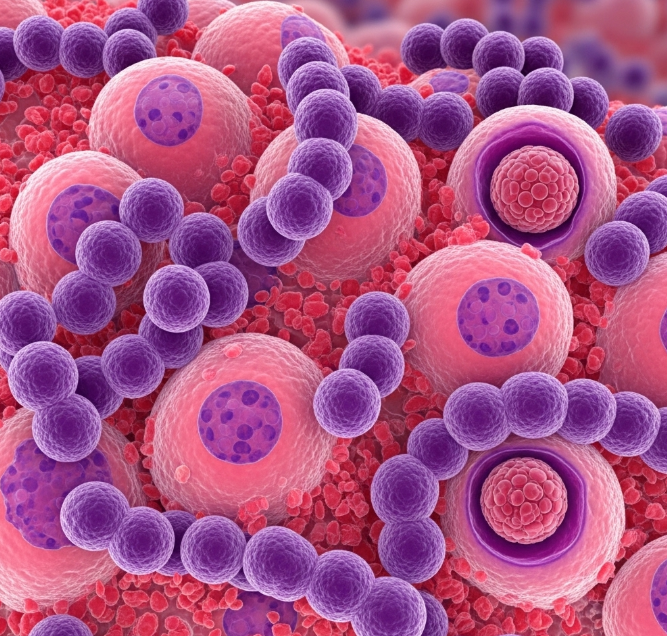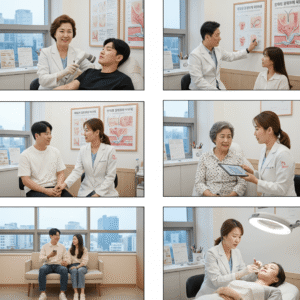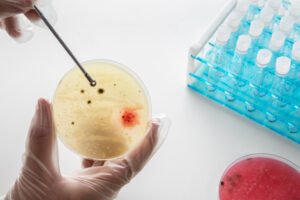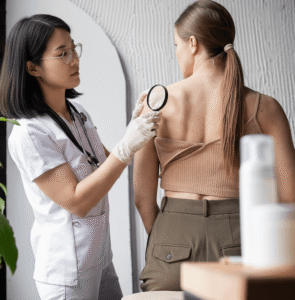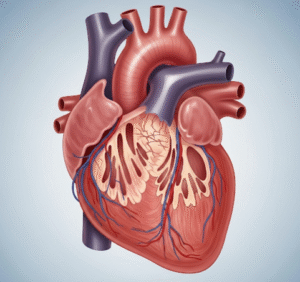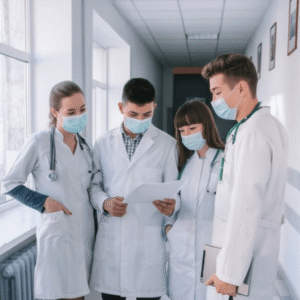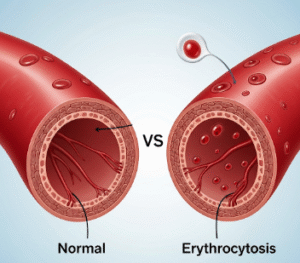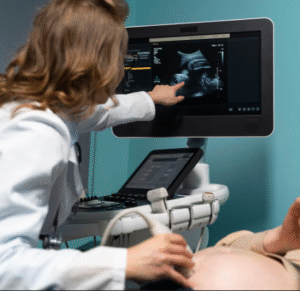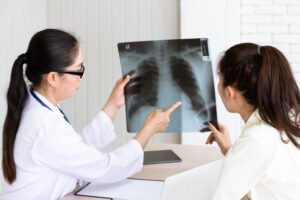Overview
Group A Streptococcal (GAS) infection is an illness caused by the bacterium Streptococcus pyogenes. These bacteria are highly contagious and can spread through close contact, respiratory droplets, or contaminated surfaces. GAS can cause a wide spectrum of diseases, ranging from mild infections such as pharyngitis (strep throat) and impetigo (skin infection) to life-threatening conditions such as necrotizing fasciitis, streptococcal toxic shock syndrome, and rheumatic fever.
In South Korea, GAS infections are managed effectively due to strong public health monitoring, advanced diagnostic facilities, and readily available antibiotics. Early diagnosis and treatment are critical in preventing complications, especially in children and those with weakened immunity.
Symptoms
The symptoms of GAS infections vary based on the part of the body affected and the severity of infection:
- Throat infections (Strep throat / Tonsillitis):
- Sudden onset sore throat
- Pain when swallowing
- Red, swollen tonsils, sometimes with white patches or pus
- Fever and chills
- Swollen lymph nodes in the neck
- Scarlet fever:
- Fine, red rash that feels like sandpaper
- High fever and sore throat
- “Strawberry” tongue (red and bumpy)
- Flushed face with pale area around the mouth
- Skin infections (Impetigo, Cellulitis, Erysipelas):
- Red, swollen, painful patches on the skin
- Pus-filled blisters or honey-colored crusts
- Warmth and tenderness around the infected area
- Invasive GAS infections (rare but severe):
- Severe localized pain disproportionate to physical findings
- High fever, chills, and rapid heartbeat
- Low blood pressure and shock (in toxic shock syndrome)
- Breathing difficulty, confusion, or multi-organ failure
Causes
GAS infection is caused by Streptococcus pyogenes, a bacterium that colonizes the throat and skin. Transmission occurs mainly through:
- Respiratory droplets: Spread by coughing, sneezing, or talking
- Direct contact: Touching sores, wounds, or infected skin
- Contaminated objects: Sharing utensils, towels, or food
- Breaks in the skin: Cuts, scratches, or surgical wounds provide an entry point
The bacteria produce toxins and enzymes that allow them to spread quickly in tissues, sometimes leading to invasive infections.
Risk Factors
Certain groups are more likely to develop severe or recurrent GAS infections:
- Children aged 5–15 years (commonly affected by strep throat)
- Elderly individuals with weaker immunity
- People with chronic diseases such as diabetes, kidney disease, or heart conditions
- Individuals with compromised immune systems (e.g., cancer patients, transplant recipients)
- Residents of crowded environments such as schools, daycare centers, dormitories, and military camps
- Those with open wounds, burns, or recent surgery
Diagnosis
In Korea, diagnosis of GAS infection is accurate and efficient due to advanced medical technologies:
- Rapid Antigen Detection Test (RADT): Provides results in 10–15 minutes; widely used for suspected strep throat.
- Throat culture: The gold standard for confirming GAS, though results take 24–48 hours.
- Blood tests: Detect systemic involvement, such as elevated white blood cell counts or markers of inflammation.
- Imaging (X-ray, CT, MRI): Used for severe or invasive infections, especially in soft tissue or bone involvement.
- Echocardiogram: Sometimes performed if rheumatic heart disease is suspected as a complication.
Prevention
Preventing GAS infections requires a combination of good hygiene and early treatment:
- Wash hands regularly with soap and water, especially after coughing or sneezing.
- Avoid close contact with infected individuals until they have been on antibiotics for at least 24 hours.
- Do not share utensils, food, drinks, or personal items like towels.
- Cover the mouth and nose when coughing or sneezing.
- Keep wounds clean and covered until healed.
- Prompt medical attention for sore throats and skin infections to prevent complications like rheumatic fever.
Treatment Options in Korea
South Korea provides comprehensive treatment for GAS infections, ranging from outpatient care to specialized hospital management:
- Antibiotics:
- Penicillin and Amoxicillin are the first-line treatments.
- For patients allergic to penicillin, azithromycin or clindamycin may be prescribed.
- Full completion of the antibiotic course is emphasized to prevent resistance and complications.
- Supportive care:
- Pain relievers (acetaminophen, ibuprofen) for fever and throat pain.
- Hydration and rest for faster recovery.
- Throat lozenges, gargles, and humidifiers for symptom relief.
- Hospitalization:
- Required for severe invasive infections such as sepsis, necrotizing fasciitis, or streptococcal toxic shock syndrome.
- Patients may need intravenous antibiotics, fluids, and intensive monitoring.
- Surgical intervention:
- In cases of necrotizing fasciitis or abscess formation, surgical removal of infected tissue is performed.
- Multidisciplinary care:
- Infectious disease specialists, cardiologists, and surgeons often collaborate for patients with complications.
Prognosis
With prompt and appropriate antibiotic treatment, most GAS infections resolve completely within 7–10 days. The prognosis is excellent for uncomplicated strep throat or skin infections.
However, untreated or delayed treatment can result in serious complications, including:
- Rheumatic fever and subsequent heart valve damage
- Post-streptococcal glomerulonephritis (kidney inflammation)
- Necrotizing fasciitis or toxic shock syndrome (life-threatening)
In South Korea, due to strong healthcare infrastructure and public awareness, early detection and treatment significantly reduce the risk of complications, leading to favorable outcomes in the vast majority of cases.

